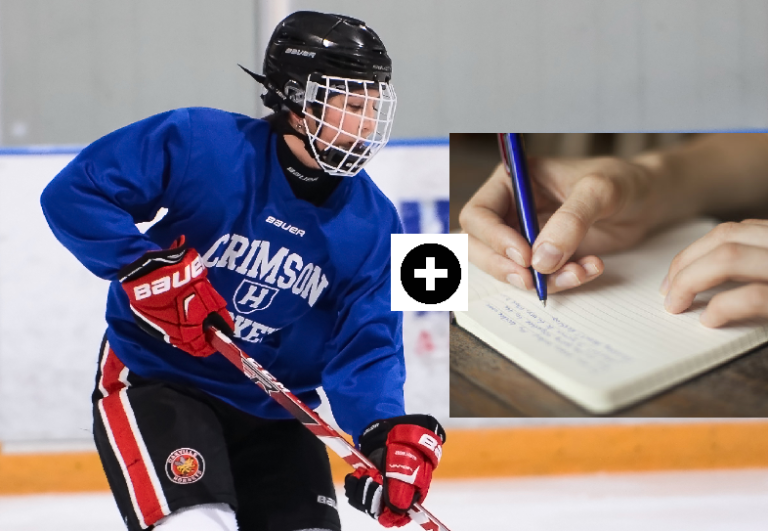Hockey is a fast-paced, difficult, and very involved sport. A one second distraction can cause a player to be several steps behind or even miss a play completely. It’s a sport that requires the fullest attention of every player. It can also be frustrating at times, requiring constant practice and thick skin. Many young hockey players may let frustrations get the best of them during times of failure, but remaining positive and looking to past successes can help them achieve more in the future.
Importance of Keeping Track
One way to stay on top of your game is to document your success. This technique may not be for everyone, as we all learn differently, however it may be worth a try.
Documenting can allow you to find inspiration from some of your best games in order to find new ideas and hone your skills for upcoming games. Keeping track of your successes and failures can help you pinpoint what may have gone wrong during a poor game and might create motivation to fix these issues for the next one. No matter how badly the game may have gone, there is always something positive to take out of it.
Keeping track of your actions on the ice can help players pick out the plays that worked and the ones that failed. If all of these are written down and kept in a journal for example, the player can look back on it to help make smarter, more successful plans for their future games. It’s not enough to simply accept that you had a poor game, you should analyze it and draw a positive message out of it in order to be better prepared next time.
If a player has a new technique to try out or a certain play to work on, he or she should document how well it went at practice and during any potential games. This should be done for every new idea and game plan. This documentation will allow the player to compare notes about successes and failures, providing analytics that will help him or her to make better plans for future games and practices. This can help you to eliminate bad habits and find out what strategies works for you and which aren’t in your favor.
How to Document
There are different ways to keep documentation of your successes, but the easiest and most effective way is with a simple pen and paper. This provides you with a quick and simple way to write down every little thing and it can be easily kept on the bench during games and practices. Some people prefer digital devices such as cell phones and tablets, but these can lead to unnecessary distractions and are often more involved than just writing things down. The immediate results can be written down and analyzed later using computers if that’s something you’re interested in doing.
Keeping a log of your successes, trials, and errors is helpful not only for your personal performance but also for that of the team. You can teach other players to document the success rate of certain plays and lines and work with the coach to use this data to prepare for upcoming games. You’ll see how your own changes in play affect the overall effectiveness of the team and be able to adjust accordingly when something isn’t going your way.
By keeping track of how well you are performing both as an individual and a team player will ultimately help you become a better player and a more respected force on the ice. When you are constantly reading and writing about plays that work and plays that don’t, you’ll have a better memory during gameplay and be able to make better decisions as a play unfolds. It is proven that writing things down helps us to memorize and learn them more effectively, so you are doing yourself a favor every time you pick up your journal.
Failures are Important Too
It’s also important to document your failures and mistakes just as consistently as you mark down your successes. Part of improving ourselves is having the ability to address our shortcomings and come up with a plan to eliminate them. Keeping a log of what went wrong will help you to look back at the game and try to figure out how and why it happened. When you can find the root of the problem, you can start putting a plan together to find a solution.
You can use your hockey journal to solve these problems with words or drawings. Some people like to create diagrams and jot down potential plays that may help them and their team next time they encounter similar situations. You can also ask your coach or other players if they have any advice. As much as we may want to fix everything ourselves, it is important to get outside perspectives. Others may have seen you doing something that you were unaware of, and their words can make you conscious of it and allow you to work on fixing it.
Your parents can help you in documenting successes as well. If they are watching your games, they know your style of play and will be able to tell you what you did right and where you faltered. Don’t take offense to this – consider it constructive criticism that is meant to help you become the best hockey player that you can be. Your parents want you to succeed and allowing them to help you document your success will only help in the long run.
Hockey is a game that requires a large amount of skill, but you can’t rely only on your talents to become a better player. You must recognize your strengths and weaknesses and do everything you can to eliminate bad habits and improve on every facet of your game. Keeping documentation of your successes and failures will help you become not only a player but also a student of the game. This will translate to greater levels of success as you continue to grow with the game.






